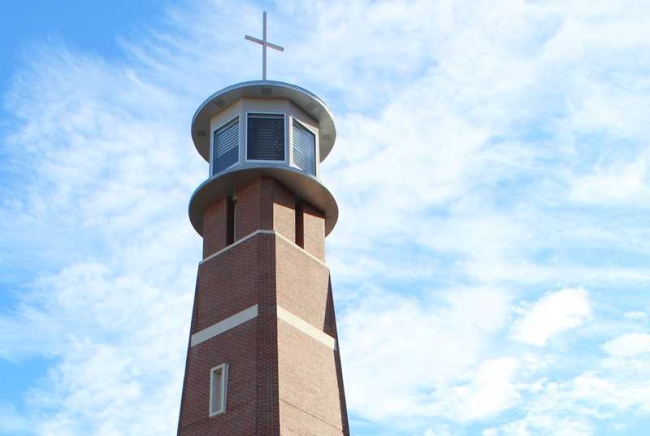You have /5 articles left.
Sign up for a free account or log in.

The Beacon at Monumental Chapel at Virginia Wesleyan University
Courtesy of Virginia Wesleyan University
When delegates to the General Conference of the United Methodist Church voted late last month to strengthen the church’s prohibitions on performing same-sex marriages and ordaining gay and lesbian clergy, it was over the opposition of Methodist colleges and universities in the U.S.
The presidents of a group of 93 colleges and universities affiliated with the UMC issued a joint statement prior to the vote calling on church leaders to amend “their policies and practices to affirm full inclusion in the life and ministry of the United Methodist Church of all persons regardless of their race, ethnicity, creed, national origin, gender, gender identity/expression or sexual orientation.” The statement was unanimously adopted by all member presidents present at a January meeting of the National Association of Schools and Colleges of the United Methodist Church.
The UMC-affiliated seminaries also opposed the adoption by the church of the so-called traditional plan, which affirms a ban on gay clergy members and imposes new penalties on clergy who perform same-sex marriages in violation of church rules.
Under the traditional plan -- which was approved by church delegates in February by a 438-to-384 margin, with much of the support reportedly coming from delegates from outside the U.S. -- clergy who officiate same-sex marriages could reportedly receive a minimum one-year unpaid suspension for their first offense. A second offense could result in removal from the clergy.
The plan will be reviewed by the church’s Judicial Council, which is expected to rule on whether it is in accordance with the church’s constitution at its meeting in late April.
“Most of our students are young, with the majority under 30 years old,” the Association of United Methodist Theological Schools said in a statement read aloud at the General Conference where the vote was held. “Public opinion polls in the United States clearly demonstrate that younger people in this country, including deeply devoted Christians, do not want to organize their spiritual and church lives around the question of excluding LGBTQIA persons.”
“It is clear to all of us as heads of seminaries that if the traditional plan passes, many students and prospective students may decide there is no place for them in this denomination,” the statement continued. “If the traditional plan passes, we may very soon lose an entire generation of leadership here in the United States.”
In the wake of the vote, the leaders of most of the theological schools have issued public statements affirming their own institutions’ commitments to diversity, inclusion and nondiscrimination and in many cases expressing disagreement or distress with the vote outcome (a list of statements can be found here). A group of faculty at Southern Methodist School's Perkins School of Theology also issued an open letter Thursday expressing sadness with the vote outcome and love and support for the institution's LGBTQIA+ students.
Javier A. Viera, the vice provost and dean of the Theological School at Drew University, wrote in a message to faculty, students, staff and alumni that he was "outraged, embarrassed, and wounded by the actions of our church. "
"We will have many decisions to make about how this vote will impact our institutional life at Drew, and how we might respond, organize, and resist these actions which so deeply affect and harm our entire community," Viera wrote. "Those conversations will take place with students, as a faculty, and at the board of trustees, as well in partnership with sister institutions of theological education across the UMC."
“I’m convinced over the next year you’ll see significant change both in the church and also within Methodist higher education,” said Scott D. Miller, the president of Virginia Wesleyan University, one of the 93 colleges and universities affiliated with the Methodist church, a group that includes such names as Duke, Emory and Syracuse Universities as well as many other less well-known small- to medium-size colleges and universities. Miller said Methodist institutions go through a process of reaffirming their affiliation with the church every 10 years.
“You will see some things occur quietly, others probably in a more revolutionary manner,” Miller said. Referring to the January meeting with other Methodist college presidents where they issued the statement calling on the church to adopt more inclusive policies, Miller said, "What I heard in the room when the Methodist presidents were together is that some schools were taking symbols of Methodism out of their marketing materials because it didn’t have the recruiting value that it once did. The impact isn’t there anymore, and all of the institutions are committed to inclusiveness. In this highly competitive higher education market, they want prospective students and prospective employees to know that all are welcome.”
“A number of schools were questioning whether they would seek reaffiliation [with the Methodist church]; a couple of them were debating whether to just discontinue their affiliation,” Miller continued. “All were concerned about the decline in financial resources.”
Miller said the financial support the church provides to Methodist institutions has been declining as church attendance (and revenues) have fallen in the U.S. At Virginia Wesleyan, he said, the institution receives $117,000 per year from the church and expects to receive next to nothing by the next time the college comes up for reaffirmation of affiliation in about eight years.
Miller also said the vote to impose new punishments on clergy who participate in same-sex weddings will raise vexing questions for institutions such as his that have Methodist chaplains on staff and whose campuses have chapels constructed with church funds.
“We have LGBT couples that work here; we have students who fall into that category,” Miller said. “I’d like to think that if they wanted to get married in our chapel we would provide that as a venue. Is that seen as in violation of the new wording? What if our chaplain, who is a joint appointment -- we pay him, but he is assigned to us via an appointment of the United Methodist Church -- if he performs the service, what will happen to him? Our feeling is that our mission of inclusiveness is something that is truly representative of us and the communities that we serve, and we don’t apologize for it.”








